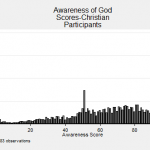After writing about religion and social homophily (i.e., like people grouping together), I became aware of a forthcoming study that addresses this issue as it pertains to family life.
It’s entitled “Bonding alone: Familism, religion, and secular civic participation” by Young-Il Kim and W. Bradford Wilcox, and it’s published in the prestigious journal Social Science Research. This article finds that religious involvement actually prompts secular civic involvement (though its effect varies by type of family). Interesting and it runs counter to popular perceptions.
Here’s the abstract:
“This study examines the influence of familism, religion, and their interaction on participation in secular voluntary associations. We develop an insularity theory to explain how familism and religion encourage Americans to avoid secular civic participation. Using data from the first wave of the National Survey of Families and Households, this study finds that familism reduces participation in secular organizations. Moreover, religion moderates the effect of familism: specifically, religious involvement tends to increase the negative effect of familism on secular civic participation. Although religious involvement in and of itself fosters secular civic participation, strong familism tends to dampen positive impacts of religious involvement. For familistic individuals, religious congregations appear to reinforce their insularity within their immediate social circle and family.”
Further elaboration from the discussion section:
“People who hold traditional family ideology tend to form in-bound social networks revolving around religious congregations. This finding is particularly interesting in light of other studies indicating that familistic orientation promotes religious involvement. Thus, our study, combined with this earlier body of research, suggests that family-oriented culture has a divergent impact on religious institutions and secular organizations, fueling religious participation and dampening secular civic engagement. Indeed, our interaction models suggest that the familism–religious involvement interaction term is negative for secular engagement: that is, when familism is combined with greater involvement in religious congregations, its negative influence on secular engagement tends to be strengthened by the religious involvement. This aggravating effect is interesting because of the main effect of religious involvement on secular engagement was found to be positive. Consistent with previous research, religious involvement, particularly religious activities outside of religious services (e.g., a Bible study group, a church committee) may not only provide a training ground for the cultivation of civic skills that are transferable to nonreligious organizations, but also serve as a recruitment channel to secular voluntary associations. However, the effect of congregational participation tends to be smaller among familistic than nonfamilistic individuals.”















